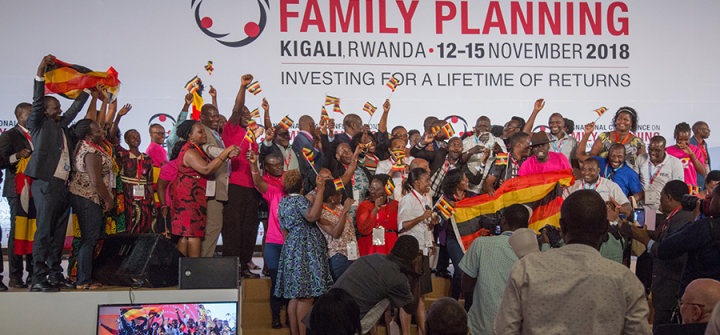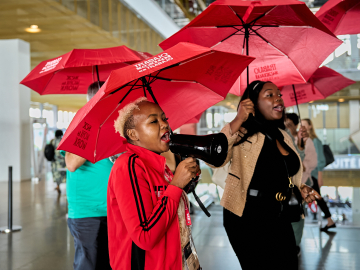#ICFP2018 Closes, with Sights Set on 2020
KIGALI—Somaliland's nomadic women want contraception that doesn’t force them to return for frequent follow-up visits.
College students in India want access to contraceptives without having to cross state borders.
In rural parts of Rwanda, women want choices beyond the fertility cycle beads offered by church-run hospitals.
Their stories and others' revealed the unfinished work of ensuring access to family planning to all women and girls want it. They propelled the closing discussions and plans as the 5th International Conference on Family Planning wrapped up yesterday.
In the last plenary session, Bending the Curve Toward 2020, panelists highlighted promising approaches and offered ideas to pool their strengths.
Manasa Priya Vasudevan, of the YP Foundation, shared the story of an Indian state that banned emergency contraception and emphasized that the unfinished agenda includes reaching adolescents. “Along with accessibility for young people, it's important to increase the acceptability of sexual and reproductive health rights conversations. We must create an enabling environment that recognizes that adolescents and young people are indeed sexual beings,” she said.
What universal health coverage means for maternal health and family planning is another part of the unfinished agenda. Ian Askew, director of the WHO’s Department of Reproductive Health & Research, sees primary health care as a pathway with transformational potential to equitable access to all health services, including family planning. He emphasized that marginalized groups must be prioritized in any human rights approach to health coverage.
The unfinished agenda will also require civil society organizations and advocates to acknowledge the importance of working with governments, said Halima Shariff, the Tanzania country director of Advance Family Planning, “so they see the value of investing in what we’re doing.” In a follow-up interview with GHN, she said that she hopes governments work with CSOs to address any data in the new FP2020 data released during the conference.
With that data showing the world is roughly halfway to the goal of providing 120 million more women and girls access to contraceptives by 2020, plenary moderator Beth Schlachter, executive director of FP2020 concluded, “We might not get there at the time that we set … but we’ll get there.”
Yesterday afternoon’s closing ceremony struck a celebratory tone as awards were given for significant leadership contributions in the field. Highlights: The governments of Burkina Faso and Uganda won Excellence in Leadership for Family Planning (EXCELL) Awards, while Save the Children Yemen and Profamilia were both recognized for their organizational leadership. And Johns Hopkins Bloomberg School of Public Health Dean Emeritus Michael J. Klag was recognized for his contributions to ICFP.
With the last awards given out and the government of Rwanda and the ICFP conference organizers thanked, the conference at the Kigali Convention Centre closed to a lively rendition of “We are Family.”
Global Health NOW’s Dayna Kerecman Myers with Gates Institute support is among the journalists reporting from Rwanda at the 2018 ICFP. You can find more news from #ICFP2018 on GHN's conference blog here.
Join the tens of thousands of subscribers who rely on Global Health NOW summaries and exclusive articles for the latest public health news. Sign up for our free weekday enewsletter, and please share the link with friends and colleagues: http://www.globalhealthnow.org/subscribe.html
Ugandans take the stage to celebrate winning an ICFP EXCELL Leadership Award. Image Courtesy of the Rwandan Ministry of Health





